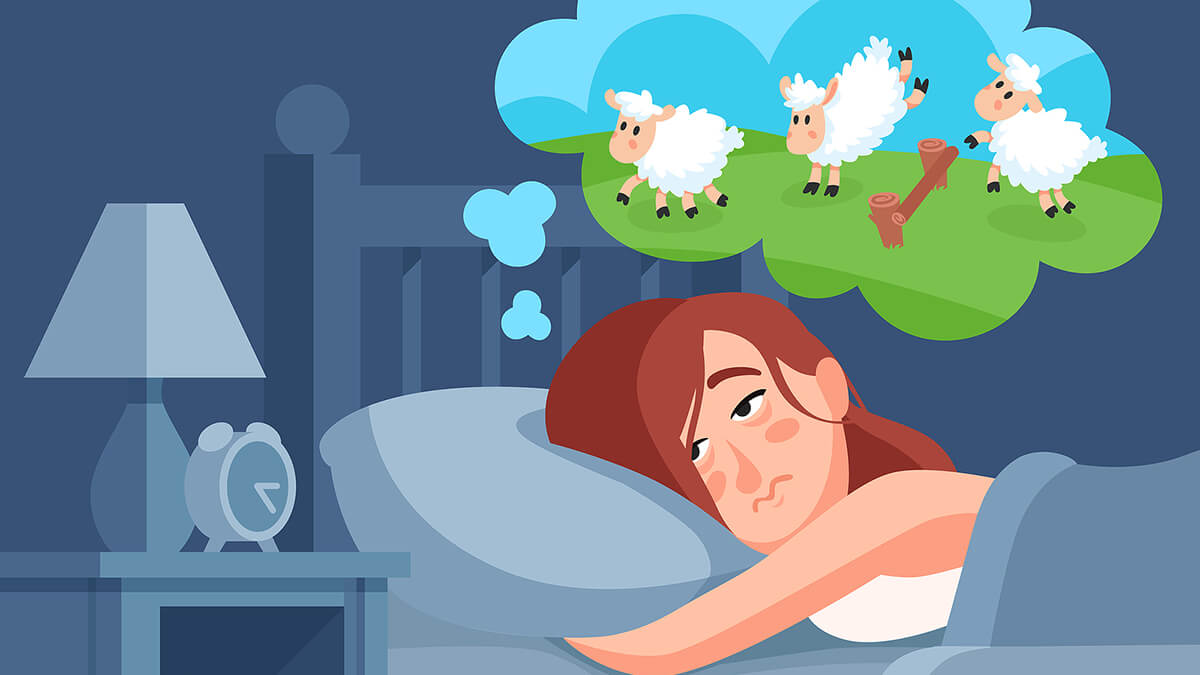Sometimes a good night’s sleep can be hard to come by. Maybe you had to be up early for work yet stayed up late binge-watching your favorite TV series. Or perhaps you had the opportunity to sleep in but found yourself waking at 5 a.m. despite only getting a few hours of rest. Inadequate sleep happens to the best of us, and though it’s frustrating—and exhausting—the occasional restless night isn’t terribly harmful. However, persistent difficulty falling and staying asleep can have major health consequences—including impaired cognitive functions. The clinical term for a chronic pattern of sleep deprivation is insomnia. Here are some of the effects this sleep disorder can have on your brain.1
Memory issues
Insomnia can impact your ability to form both short- and long-term memories. This is primarily because your brain depends on sleep to build connections that help you process, analyze, and retain new information. So, not only is getting a good night’s sleep recommended before a big exam so you feel well rested, but it’s also vital to effectively recalling information that you will need to apply.
Trouble focusing
Lack of concentration is a major insomnia effect. An exhausted brain can’t adequately focus on the important tasks and priorities at hand—especially not for extended periods of time. Critical thinking and problem-solving skills are also negatively impacted by prolonged sleep deprivation. And ultimately, when these cognitive abilities are impaired, an overall decrease in productivity is inevitably experienced.
Mood swings
A person’s frame of mind and disposition can be affected by a variety of things, such as hunger, stress, certain medications, and interpersonal relationships. Sleep deprivation is also a well-known factor when it comes to erratic changes in mood. Insomnia tends to make individuals more emotional and quicker to anger. Sometimes, even partial sleep deprivation can have a significant effect on mood. Fortunately, once an individual becomes well rested and sleep becomes regulated, their mood will often return to normal.
Impaired creativity
Have you ever tried to tap into your imagination after a poor night’s sleep? It likely seemed more difficult than usual. That’s because a common insomnia effect is stifled creativity. Executive dysfunction—caused by the brain’s tired frontal lobe—cannot properly facilitate innovation and inventiveness. So, though it may be true that some of world’s greatest artists, writers, and designers have spent many late nights crafting their magnum opus, long-lasting insomnia has actually proven to be detrimental to the creative process.
Increased impulsivity and other psychological risks
Believe it or not, insomnia can actually increase impulsive behavior. This effect is often experienced after prolonged bouts of insomnia. Other psychological risks include increased anxiety, depression, paranoia, and suicidal ideation. In some instances, individuals can even experience auditory or visual hallucinations as a result of sleep deprivation.
Pursue Your Master’s Degree in Counseling Online at Walden University
If you want to make a difference in the lives of others as a highly qualified mental health professional, Walden can help you reach that goal. When you enroll in Walden’s MS in Clinical Mental Health Counseling program, you can gain the confidence and skills you need to help clients cope with daily life and surmount their greatest challenges. Choose the general program or one of five specializations—Forensic Counseling; Trauma and Crisis Counseling; Marriage, Couple, and Family Counseling; Addiction Counseling; and Military Families and Culture—to focus your online counseling degree program on the topics that matter most to you. And at Walden, an accredited university, you can earn your counselor’s degree online while you continue to work full time. That’s because with online education, there’s no need to completely rearrange your schedule or commute to campus—you can take classes at whatever time of day works best for you as you earn your MS in Clinical Mental Health Counseling and advance your career in counseling.
Walden University is an accredited institution offering an MS in Clinical Mental Health Counseling program online. Expand your career options and earn your degree using a convenient, flexible learning platform that fits your busy life.
1Source: www.healthline.com/health/sleep-deprivation/effects-on-body
Walden University is accredited by The Higher Learning Commission, www.hlcommission.org.
Walden University’s MS in Clinical Mental Health Counseling program is accredited by the Council for Accreditation of Counseling and Related Educational Programs (CACREP), a specialized accrediting body recognized by the Council for Higher Education Accreditation (CHEA). CACREP accreditation is a requirement for licensure in many states.
Note on licensure: The MS in Clinical Mental Health Counseling program is designed to prepare graduates to qualify to sit for licensing exams and to meet the academic licensure requirements of many state counseling boards. Because no graduate program can guarantee licensure upon graduation, we encourage students to consult the appropriate agency to determine specific requirements. For more information about licensure, students should visit the National Board for Certified Counselors at www.nbcc.org/search/stateboarddirectory and/or the American Association of State Counseling Boards at www.aascb.org, and contact the appropriate licensing body. Learn more about professional licensure.




